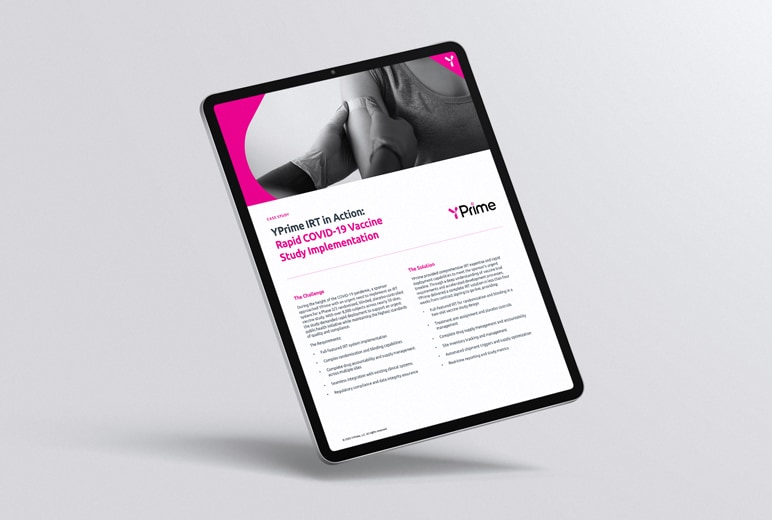Despite advances in Interactive Response Technology (IRT) and Randomization and Trial Supply Management (RTSM), many clinical trial sponsors still struggle to find IRT vendors that can keep pace with today’s protocol complexity, budget pressure, and accelerated timelines.
IRT, often referred to as Randomization and Trial Supply Management (RTSM), plays a central role in managing patient randomization, treatment assignment, and clinical trial supply execution.
Today’s trials require IRT partners who can collaborate early, anticipate change, and adapt quickly without introducing operational risk. This buyer’s guide outlines what sponsors should expect from today’s IRT vendors—and how the right approach can improve speed, cost control, and execution across complex trials.
At the 2025 Informa IRT Conference, YPrime’s Jon Paras joined other industry leaders to unpack these challenges and explore what forward-thinking sponsors need from their IRT vendors today. Below are key takeaways from that discussion, centered not just on configurability, but on how true partnership and planning can drive smarter decisions and better outcomes.
Most clinical trial sponsors agree that today’s configurable IRT platforms can reduce build timelines—but the real value lies in how quickly teams can get up and running, especially when protocol amendments are on the horizon. As discussed at the IRT Conference, speed alone doesn’t guarantee efficiency or cost savings. What makes the difference is early collaboration between sponsor and vendor: aligning on protocol requirements, anticipating likely changes, and identifying the most efficient path forward. A configurable system is only as powerful as the strategy behind how it’s used.
As trials grow more complex, with adaptive designs, basket studies, and master protocols, the volume of amendments is only increasing. The real challenge isn’t whether changes happen—it’s whether your IRT platform and IRT vendor are built to absorb them. That means designing flexibility from the outset, with a clear understanding of what changes can be handled through configuration versus those requiring revalidation or custom coding.
Sponsors should avoid handing over a protocol change and simply asking for a cost estimate. Instead, bring your IRT or RTSM experts into the planning process early. There are often multiple ways to implement a change, and some may be significantly more cost- or time-efficient—without compromising data integrity.
There’s a growing tension in the industry between bespoke systems and configurable platforms. When protocols are overly complex, or designed without IRT input, sponsors can unintentionally lock themselves into systems that are challenging to change. Improved collaboration with vendors during protocol development allows for streamlined configurations that still meet scientific needs, without the burden of custom IRT builds.
An important shift we are seeing is the growing need for genuine partnership between sponsors and IRT providers. Too often, communication is limited to handoffs, where a protocol amendment is delivered, and the expectation is a fast turnaround, with little discussion of tradeoffs or options. But that approach misses the opportunity to do things better.
To truly benefit from a configurable IRT platform, both sides need to engage early and transparently. Clinical trial sponsors should understand what the system can and can’t do quickly, and where added complexity may require more time or effort. At the same time, vendors need to understand the study’s operational goals, where flexibility exists in the protocol, and how budget constraints might shape decisions. With that shared understanding, we can build smarter, more efficient IRT or RTSM solutions from the start to reduce rework and manage timelines more predictably, while delivering better value throughout the trial.
When evaluating IRT platforms or vendors, the IRT system can only perform as well as the protocol allows. Overcomplicated designs—such as 17 stratification factors or multiple overlapping cohorts—can create avoidable hurdles for even the best IRT platform.
Bringing IRT experts into protocol design conversations can help simplify without sacrificing scientific rigor. And when simplification isn’t possible, early involvement means the IRT partner can help engineer flexibility into the system from day one.
When it comes to IRT and RTSM for clinical trials, sponsors don’t just want a system that works. They want one that’s faster to implement, easier to adapt mid-study, and capable of handling increasing protocol complexity. That’s where configurability becomes truly valuable: not just as a technical feature, but as a strategic enabler.
What Sponsors Should Expect from High-Performing IRT Vendors
Sponsors evaluating IRT vendors should expect more than functional systems. The right partner delivers faster implementation without sacrificing control, clear guidance during protocol amendments, transparent collaboration across teams, and predictable timelines and costs. Ultimately, selecting an IRT vendor is about people, process, and platform—not technology alone.
By working together early and aligning on protocol goals, timelines, and change scenarios, sponsors and vendors can move beyond reactive change management and toward proactive collaboration. Because in the end, it’s not just about building faster. It’s about building smarter. And that starts long before the first patient is enrolled.
Selecting the right IRT or RTSM vendor isn’t just about technology—it’s about the people, processes, and platform behind it. For a deeper look at common challenges and solutions from an IRT expert, explore a recent blog by Jon Paras, SVP of IRT Strategy at YPrime: IRT in Clinical Trials: Why It Still Frustrates Sponsors—and How to Fix IT. In this blog, Jon explores the top challenges sponsors face when working with IRT vendors, from mid-study changes to system integrations, and shares actionable strategies to make IRT faster, more connected, and more reliable across complex trials.
Related Resources:
- YPrime IRT Accelerates Global Cardiovascular Clinical Trial: https://www.yprime.com/yprime-irt-in-action-accelerating-global-cardiovascular-research/
- What the ICH E6(R3) Guidelines Mean for IRT Companies Today: https://www.yprime.com/what-the-ich-e6r3-guidelines-mean-for-irt-companies-today/
- YPrime IRT Checklist: https://www.yprime.com/irt-checklist-streamline-irt-vendor-search-with-confidence/
Check Out What Our Experts Have to Say
about trial design, data capture, operational efficiencies, and, ultimately, how to solve with certainty in clinical research.



